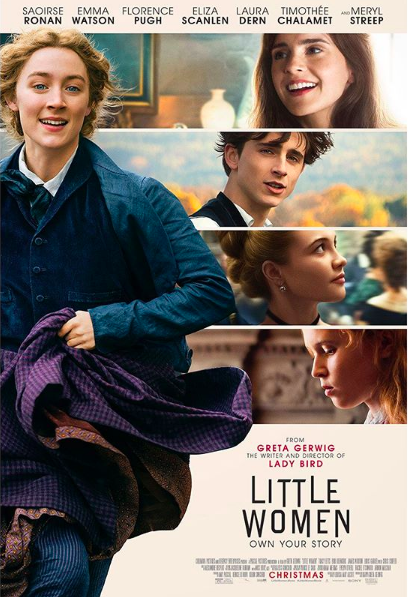‘Little Women’ Successfully Highlights Female Empowerment

@littlewomenmovie
Little Women, released on Christmas Day 2019, follows the story of four sisters through their journey to becoming their own self. Photo Courtesy of Little Women (@littlewomenmovie).
January 5, 2020
Set in the picturesque wintery bliss of Concord, Massachusetts, the beloved classic tale of Little Women underwent a transformation and brought an even further depth to Louisa May Alcott’s famous novel and previous renditions of the film. Mingling themes of female empowerment and the love and strength present in the March family, the 19th century book that captivated readers still makes its mark today. Director Greta Gerwig’s new take on the classic remains true to the heart of the March sisters and the enrapturing story remains, while highlighting themes such as equality more so, which perfectly encompasses issues of sexism still ingrained in our country.
The film includes a star-studded cast including, acclaimed actress Saiorse Ronan as the quippy and intelligent Jo, Emma Watson as the gentle hearted Meg, Eliza Scanlen portraying musically gifted Beth, and Florence Pugh playing the youngest and self-centered sister, Amy. Oscar nominated actor Timothee Chalamet plays the lovable neighbor Laurie who befriends the March family. Legendary actress Meryl Streep portrays the role of Aunt March, whose conservative and traditional nature is seen to clash with the forward thinking ideas of young Jo. Last but not least, Laura Dern plays their loving mother, Marmee.
During the ensuing battle of the Civil War, the March women miss the comfort and security of the days before the war, when their father was not off at the frontlines and life seemed simpler. Their mother Marmee urges them to be giving to those in need and to put their life and their many blessings into perspective. Jo, the second eldest daughter who is independent and strong willed in nature, helps to pull the family together even as tensions and tragedy befall them. Jo’s character has long been held as icon, an emblem of female bravery, and the brilliance of her character in the book is that it contrasts with the heavily imposed societal constructs of the time when women were expected to marry wealthy men for the sake of their family’s livelihood and their own.
Ronan’s depiction of Jo is wonderful as she is able to illustrate Jo’s inclination to be her own self as well as her desire to become a published novelist who writes works that will move and inspire, even as she is pushed by her publisher to write stories “that will sell”. With a forceful tone, her publisher tells her that these stories must conclude with the main heroine married at the end. Ronan highlights Jo’s familiar features; loyalty to her loved ones, strength, and a sharp mind.
One aspect of this stunning film is the inventive, beautiful, and unique cinematographic style and screenplay written by Greta Gerwig. The film begins at the end of the book and weaves together two times for the March family, seven years apart. Gerwig excellently juxtaposes the golden-toned days of their youths, as the March sisters act in adventurous plays as part of the their theater production in their attic and spend time with each other with the contrasting bleaker days of seven years later as Jo returns from working as an aspiring writer in New York. She is faced with a heartbreaking death that inspires her to write from the heart. Jo writes with a fervency, piecing together an account of their lives onto paper. She negotiates with her publisher who will only give her a meager amount of money for the book. In exchange for a quick payment, he states that he wants all rights to the copyright of the book. She argues with him and earns a higher profit as well as maintaining full ownership of her book. Gerwig’s alternative ending to Jo getting married and living out her days in marital contentment shows Jo is an independent maker of her own story and that romance and love are not all that define her. In a single scene, Jo brings up the misconstrued idea that women should not want for more than marriage and a home. With a moving and somber tone, Jo shatters patriarchal notions with the fact that women are full of goals, aspirations, and fruitful in their abilities and talents.
Aside from Jo’s determined character, Amy’s clear cut development throughout the film and the way Gerwig chose to depict her is excellent. Florence Pugh portrays the young Amy in her selfish and dramatic youth at the onset of the film. As she matures she speaks of the injustices she feels of not being able to be a household breadwinner because of gender biases and the predetermined ideas of marriage. Amy brings up the lack of women’s rights to have legal authority over her children and that this inequality burdens her mind.
This film brings out the best central stories of the little women, incorporating a tale told many times over with wit, emotion, and with vivid scenes that capture the essence of the story that has stood the test of time and still applies today. The film discusses varied lifestyles and why women should not be chastised for living one way or another. It is important that as long as they feel fulfilled with their life choices that is all that matters. It puts into perspective that a women can be happy independent or in a relationship. This film is the true exploration of how women have and continue to strive to be more than just the picture perfect woman, fitting the traditional roles and standards that society has boxed them into. The role of a woman is not a specific pathway nor is it the same for every woman. For Jo, seeking a life of adventure and artistic creativity through writing is her ideal life. For her older sister Meg, it is marrying a kind man she becomes acquainted with and to start a family. This film teaches that no one lifestyle triumphs over the other, that it all boils down to what a woman wants to do with her life. Only she is the ultimate narrator of her story, whatever it may be.
Over all, this film has all the components of a classic, with scenic imagery, clever dialogue, and a message that is inspired from the past, continues to stay true and will help further mold the future. A good film is one that can be seen through a lens with audiences, young and old, with varied perspectives and still carry an unwavering impact. Greta Gerwig’s remake of Little Women does just that and keeps the meaning of their story darting through your mind long after you’ve left the theater.


